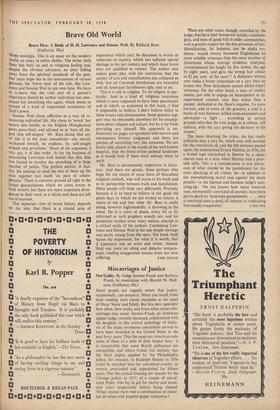Miscarriages of Justice
Not Guilty. By Judge Jerome Frank and Barbara Frank, in association with Harold M. Hoff- man. (Gollancz, 18s.) MOST people are vaguely aware that justice. occasionally, can miscarry. Many can recall, from their reading, such classic examples as the cases of Oscar Slater and Edalji. But few dare speculate how often, how easily, and from what causes mis- carriages may occur. Jerome Frank, an American appeal judge, recently deceased, collaborated with his daughter in this critical anthology of thirty- six of the many erroneous convictions proved to have been recorded in the United States in the past forty years. That the cases are American robs some of them of a little of their impact here : it is conceivable that some British policemen are corruptible, and others brutal, but unlikely that the third degree applied by the Philadelphia police, for instance, to Rudolph Sheeler in 1936 could be matched here for calculated cruelty, or remain unrevealed and unpunished for fifteen years. Nor the cynical framing for murder by the Chicago police, in 193?, of a couple of out-of- work. Poles, who lay in jail for twelve and seven- teen years respectively before being cleared. (What cleared them was a combination of mater- nal devotion and popular-paper enterprise.) There are other cases, though, recorded by the judge, that have their lessons for jurists, criminolo- gists, and men of good will in older communities, with a greater respect for the due processes of law. Identification, for instance, can be shaky evi- dence: would twenty thousand Englishmen be more reliable witnesses than the same number of Americans whose average evidence, analysed, `overestimated the height by five inches, the age by eight years, and gave the wrong hair colour in 82 per cent. of the cases'? A dishonest witness may make a better impression on a jury than an honest one. Poor defendants cannot afford expert witnesses. On the other hand, a man of modest means, just able to engage an incompetent or in- experienced counsel, may fare worse than a pauper, defended at the State's expense. To some lawyers, and to some of the greatest, a trial is a battle of wits between skilled cross-examiners and advocates—`a fight . . . according to certain ground rules that the trial judge, as a referee, will enforce, with the jury giving the decision to the winner.'
The more shocking the crime, the less coolly judicious may a jury be, which may well account for the conviction of, and the life sentence passed upon, the moustached Ernest Mattice, in 1936, for a brutal rape committed in Denver by a clean- shaven man at a time when Mattice had a prov- able alibi. This is a consideration in any discus- sion of what should be the punishment for the most shocking of all crimes. So—in addition to the overwhelming moral case against the death penalty—is the learned and humane judge's sum- ming-up : `No one knows how many innocent men, erroneously convicted of murder, have been put to death by American governments . . . once a convicted man is dead, all interest in vindicating


































 Previous page
Previous page